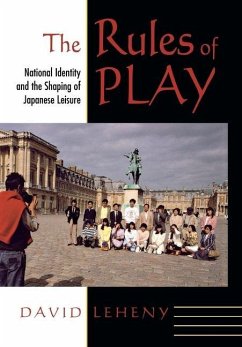The Japanese government seeks to influence the use of leisure time to a degree that Americans or Europeans would likely find puzzling. Through tourism-promotion initiatives, financing for resort development, and systematic research on recreational practices, the government takes a relentless interest in its citizens' "free time." David Leheny argues that material interests are not a sufficient explanation for such a large and consistent commitment of resources. In The Rules of Play, he reveals the link between Japan's leisure politics and its long-term struggle over national identity.
Since the Meiji Restoration, successive Japanese governments have stressed the nation's need to act like a "real" (that is, a Western) advanced industrial power. As part of their express desire to catch up, generations of policymakers have examined the ways Americans and Europeans relax or have fun, then tried to persuade Japanese citizens to behave in similar fashion-while subtly redefining these recreational choices as distinctively "Japanese."
In tracing the development of leisure politics and the role of the state in cultural change, the author focuses on the importance of international norms and perceptions of Japanese national identity. Leheny regards globalization as a "failure of imagination" on the part of policymakers. When they absorb lessons from Western nations, they aim for a future that has already been revealed elsewhere rather than envision a locally distinctive lifestyle for citizens.
Since the Meiji Restoration, successive Japanese governments have stressed the nation's need to act like a "real" (that is, a Western) advanced industrial power. As part of their express desire to catch up, generations of policymakers have examined the ways Americans and Europeans relax or have fun, then tried to persuade Japanese citizens to behave in similar fashion-while subtly redefining these recreational choices as distinctively "Japanese."
In tracing the development of leisure politics and the role of the state in cultural change, the author focuses on the importance of international norms and perceptions of Japanese national identity. Leheny regards globalization as a "failure of imagination" on the part of policymakers. When they absorb lessons from Western nations, they aim for a future that has already been revealed elsewhere rather than envision a locally distinctive lifestyle for citizens.
Dieser Download kann aus rechtlichen Gründen nur mit Rechnungsadresse in A, D ausgeliefert werden.









